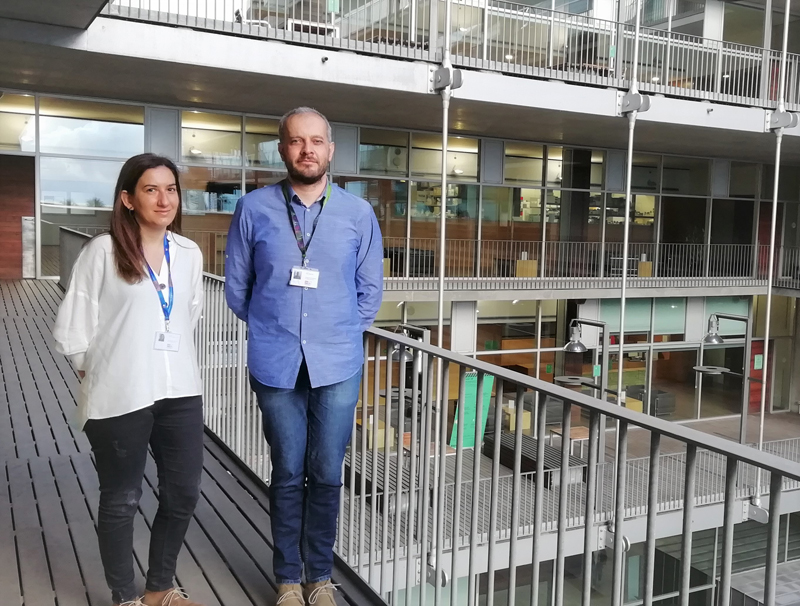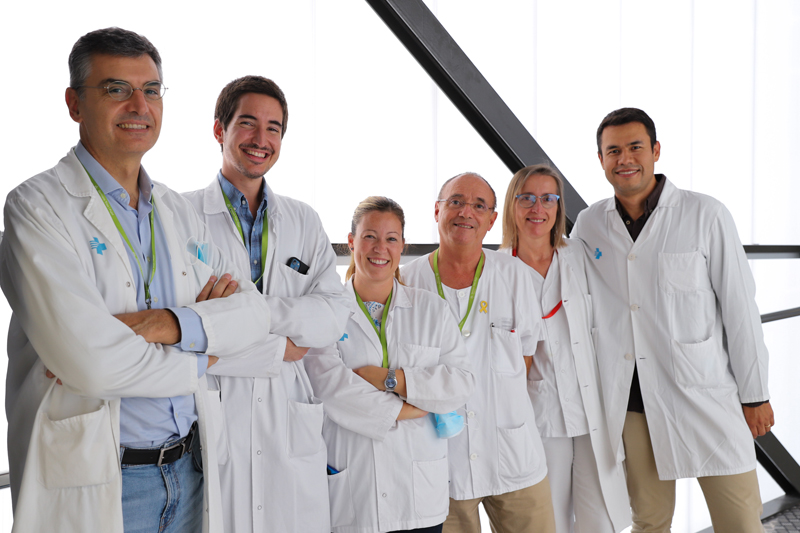
26/10/2022 - Press release
People with low levels of this compound who suffer this pathology have almost a 40% greater risk of dying or being admitted to hospital than those with higher levels. This is according to a study carried out jointly by Hospital Germans Trias i Pujol and the Hospital del Mar Medical Research Institute (IMIM-Hospital del Mar). The research team analysed blood samples from 905 patients with heart failure, who were monitored for three years. The results of the study have been published in the Journal of the American College of Cardiology.

IMIM team: Iolanda Lázaro and Aleix Sala-Vila. Source IMIM.
Higher levels of plant-based omega-3 fats reduce the risk of death and hospital admission in people with heart failure. This is according to a joint study by researchers at Hospital Germans Trias i Pujol and the Hospital del Mar Medical Research Institute, published in the Journal of the American College of Cardiology, involving the follow-up of almost a thousand patients.
The work has shown how a diet rich in a particular type of omega-3 fat is associated with a better outcome in cases of heart failure, which occurs when the heart is unable to adequately pump blood throughout the body. This disease, which can have many different causes, gets gradually worse. Although it cannot be completely cured, it can be controlled through pharmacological and lifestyle strategies. The beneficial effects of omega-3 fats on the heart are well known, but the vast majority of studies have focused on omega-3s from oily fish. In this case, the researchers from the two Catalan centres investigated a variant that comes from plant foods, such as walnuts.
39% greater risk of death or hospitalisation
The study quantified the levels of a plant-based omega-3 fatty acid in blood samples from more than 900 patients with heart failure, who were monitored for three years after the blood sample was taken. Over this period, some patients died, or their disease worsened and they needed to be admitted to hospital. The researchers found that patients with low levels of vegetable omega-3 in their blood had a 39% higher risk of dying or being admitted to hospital, when compared to those with higher levels.
For Antoni Bayés-Genís, clinical director of the Heart Institute at Germans Trias and co-principal investigator of the study, the relevance of this finding is that "It provides evidence of a modifiable lifestyle factor, diet, which is related to lower mortality rates and decreased need for hospital admission in the context of heart failure. This is the first step towards giving cardiologists a new, safe, cheap and accessible strategy for improving the quality of life of heart failure sufferers."
For Aleix Sala, a researcher at the IMIM-Hospital del Mar and co-principal investigator of the study, "Being able to look at the levels in the blood gives us information on two fronts. Firstly, it helps us determine the exact fat intake in the weeks prior to obtaining the blood sample. Secondly, it allows us to better identify who would benefit most from following a diet supplemented with these omega-3s. This means that we should not treat the entire population, but rather the 25% with the lowest levels."

Hospital Germans Trias i Pujol Team. From left to right: Antoni Bayés, Pau Codina, Evelyn Santiago, Josep Lupón, Mar Domingo and Germán Cediel. Source: Hospital Germans Trias i Pujol.
Reference article: Lázaro I, Lupón J, Cediel G, et al. Relationship of Circulating Vegetable Omega-3 to Prognosis in Patients With Heart Failure. J Am Coll Cardiol. 2022 Nov, 80 (18) 1751-1758.
Servei de Comunicació:
Marta Calsina Freixas(ELIMINAR)
Tel:
(+34) 93 316 06 80
Doctor Aiguader, 88
08226 Barcelona
© Institut Hospital del Mar
d'Investigacions MèdiquesLegal Notice and Privacy Policy | Cookie Policy | Site Index | Accessibility | Find Us | Contact